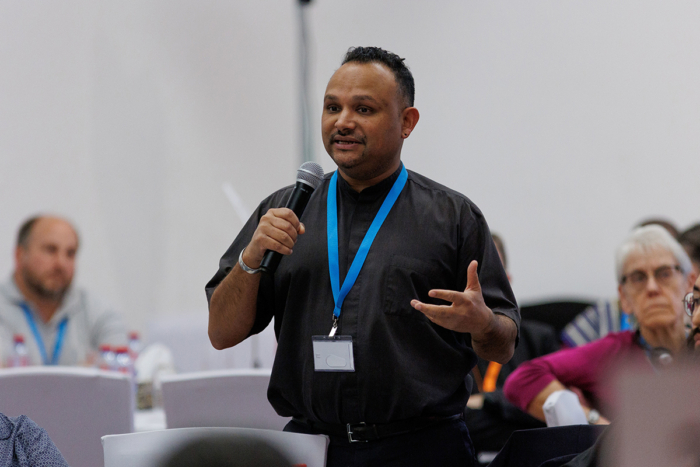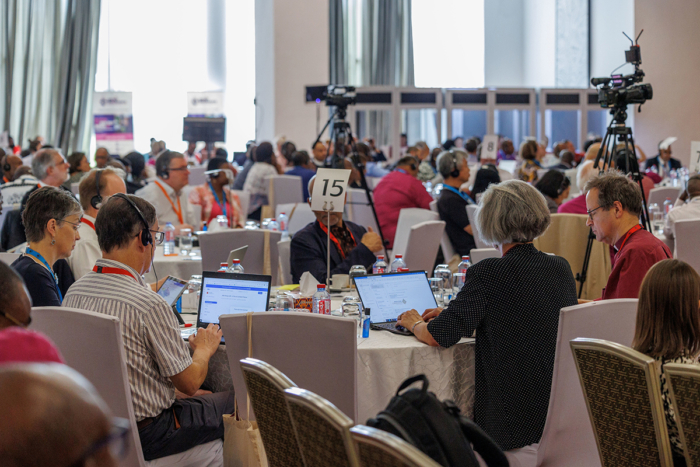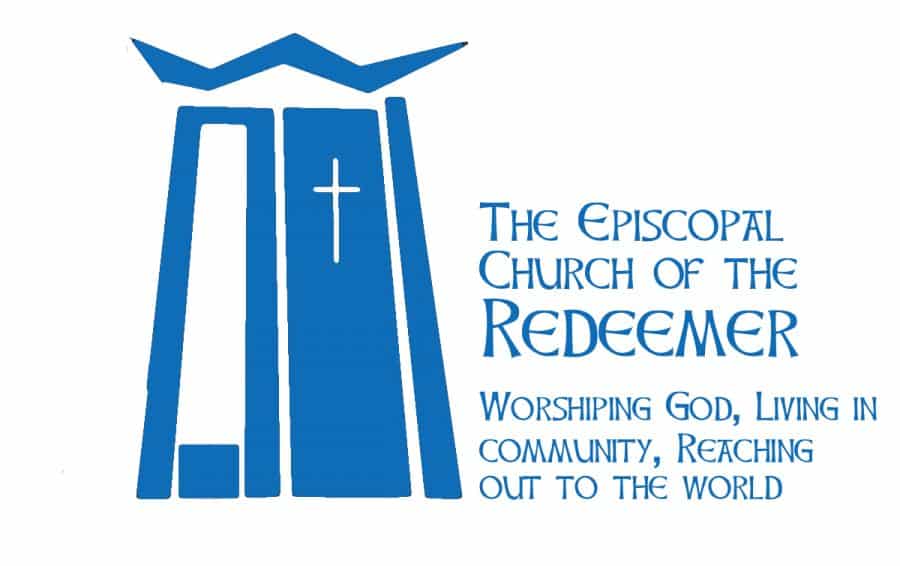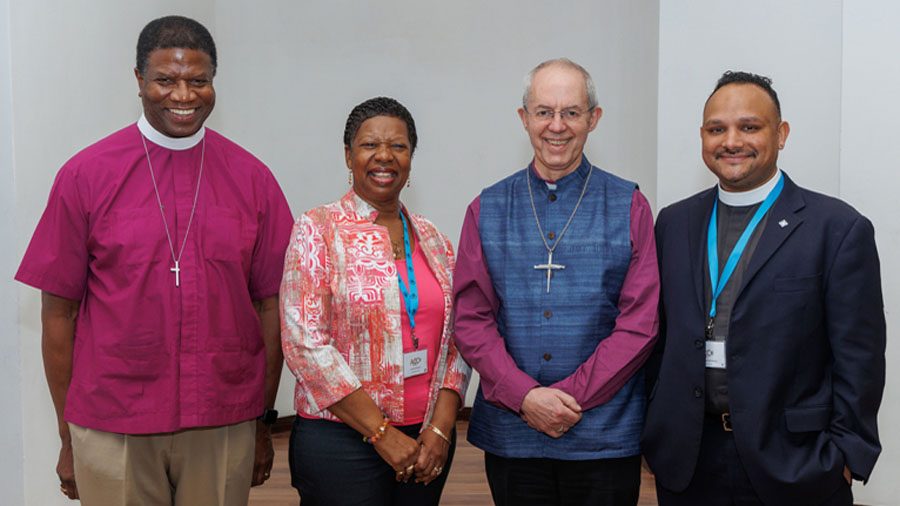[Episcopal News Service] The Episcopal Church’s representatives to the Anglican Consultative Council (ACC) participated February 14, 2023, in a discussion on the challenges of maintaining – and, in some ways, restoring – unity among the worldwide Anglican Communion’s 42 provinces at a time of stark divisions over human sexuality and marriage equality.
About 110 representatives from 39 of those provinces are in Accra, Ghana, February 12-19, 2023, for the 18th meeting of ACC, one of the Anglican Communion’s four Instruments of Communion and the only to include laity. The other three are the Lambeth Conference of Anglican bishops, the Primates’ Meeting and the archbishop of Canterbury, an office known as the “focus of unity.”
The importance of lay people
During presentations originating from small table discussions about a report on unity, faith and order, Annette Buchanan, a lay leader from the Diocese of New Jersey, expressed concerns about the Anglican Communion’s structural power dynamic that gives greater weight to the voices of bishops and other clergy over lay voices.
“No one asked the laity when you were at Lambeth what issues would be the priority issues,” Buchanan said, addressing the two bishops who were leading the session.
“No one asked the laity whether or not gender-based issues or LGBTQ issues were the priority. … The voices of the majority are not being heard. Those who are in the hierarchy have instruments whereby they discuss issues with each other, and there is no input [from lay leaders]. And so, this becomes a matter of power, status, control.”
Buchanan’s reference to the Lambeth Conference connected the issue of lay priorities to the divisions that were on display at that conference held late last July and into early August in Canterbury, England. Some conservative bishops, mostly from provinces in Africa and Asia, sought to amplify their criticisms of The Episcopal Church and other provinces that have welcomed LGBTQ+ people more fully into the life of their churches, however, it was not evident that such criticisms reflected the daily concerns of the parishioners in the conservative bishops’ provinces.
Bishop Graham Tomlin of the Church of England, who serves as chair of the Inter-Anglican Standing Commission on Unity, Faith and Order, thanked Buchanan for asserting the important role of lay leaders. “It’s a really helpful reminder to us to make sure that voice of the laity – which of course is here in the ACC but not in the other instruments – is heard in the bit of work that we do as well.”
Autonomous, independent churches
The Anglican Communion is made up of autonomous, interdependent churches that all have historic roots in the Church of England. There is no central decision-making body in the Anglican Communion. Provinces retain authority to make decisions for themselves while coming together at ACC about every three years for prayer, worship and discussions on the future of the Anglican Communion.
Each Anglican province may appoint and send up to three members to ACC, typically a bishop, another clergy member and a lay person. Buchanan, a former Union of Black Episcopalians president, is joined in Ghana by Maryland Bishop Eugene Sutton and the Rev. Ranjit Mathews, the Diocese of Connecticut’s canon for mission, advocacy, racial justice and reconciliation, representing The Episcopal Church.
Tomlin led the afternoon session February 14 along with Bishop Paul Korir of Kenya. In presenting their report on behalf of the Commission on Unity, Faith and Order, Tomlin and Korir stressed that the structure of the Anglican Communion has evolved and may continue to evolve to accommodate differences among provinces while fostering unity around core faith beliefs.
The commission’s members, Korir said, “quickly agreed that all Anglicans, indeed all Christians, are called by God to consider carefully and prayerfully what communion, “koinonia,” means. That is to consider the nature of the fellowship that we share in Jesus Christ.” The commission’s report and recommendations included a proposal to study the Anglican Communion’s current structure and report back to ACC in three years on possible paths forward.
“We hope to be able to speak directly to some of the present impairments in the life of the Anglican Communion,” Korir said.
[embedyt] https://www.youtube.com/watch?v=gGCJ4F-8cTM[/embedyt]Disagreements over LGBT+ issues
Such impaired relations were made plain at this in-person meeting by the absence of three Anglican provinces. Leaders of the provinces of Nigeria, Uganda and Rwanda have not participated in the Instruments of Communion for at least 15 years because of their objections to some provinces’ ordination of openly gay and lesbian clergy and adoption of marriage rites and blessings for same-sex couples.
Last week, the Church of England’s General Synod endorsed its own plan to bless same-sex unions for the first time while stopping short of condoning same-sex marriage. A group of conservative Anglican leaders known as the Global South Fellowship of Anglican Churches responded by saying that the Church of England’s actions call into question Welby’s ability to uphold the archbishop of Canterbury’s role as a “focus of unity.”
The Rev. Joseph Bilal, an ACC member from South Sudan, rose to say that he thinks one of the roots of impairment is a breakdown in the ability of Anglicans to listen openly.
The importance of listening
“In which way could we be able as [the] Anglican Communion to listen to one another and also act in a way that it doesn’t affect another?” Bilal said. That “is one of the biggest struggles that I have.”

Mathews, The Episcopal Church’s clergy member on ACC, said he appreciated Bilal’s point about the importance of listening.
“If we look around this room, this is the beauty of our communion, the diversity,” Mathews said. “Any sort of unity should not be weaponized or seen as coercive, but if we can live and truly be who we are and if the quality of our listening can go deeper, I think that’s the invitation and our vocation as the communion.”
Core Christian beliefs transcend differences
Senzo Mbhele, the lay member from the Anglican Church of Southern Africa, shared that his table’s discussion had focused on how core Christian beliefs transcend denominational, provincial and cultural differences.
“When we approach the throne of heaven one day, there’s no way God is going to say, ‘well done, my good and faithful Anglican.’ He will say, ‘well done, my good and faithful servants.’ And he will not differentiate between black or white, Global South or North,” Mbhele said.
At the same time, he warned that the work toward unity through faith may not overcome existing power imbalances. “The more we work together with different people, one of the dangers is that the more powerful will then suppress the cultures that are weaker, in whatever sense.”
The Rev. Andrew Atherstone, an ACC member from the Church of England, echoed such concerns while turning the focus on his own province.
“England always likes to think of itself as first … sort of first among equals,” Atherstone said. “Is that really appropriate in the new communion or whatever shape it might be? Some work on that from your group would be appreciated.” (The archbishop of Canterbury, who also heads the Church of England, often is considered the historic “first among equals” in the Anglican tradition.)
Tomlin acknowledged that his commission will have to consider the future of “the Anglican Communion in a post-colonial world.”

Good differentiation
Actions of ACC are not binding on the member provinces, though Tomlin said in his introductory remarks that the provinces may better serve their shared mission by joining together.
“When we serve others in the name of Christ together, that is so much more powerful as a witness than when we do it alone,” he said.
Later in the day, ACC members considered their first set of resolutions, including the one on “good differentiation” submitted by the Commission on Unity, Faith and Order. The resolution “affirms the importance of seeking to walk together to the highest degree possible and learning from our ecumenical conversations how to accommodate differentiation patiently and respectfully,” and it tasks the commission with developing proposals for the ACC to review.
After additional discussion by ACC members, the resolution passed with a show of hands.
—David Paulsen is an editor and reporter for Episcopal News Service. He can be reached at dpaulsen@episcopalchurch.org.

Church of the Redeemer
Church of the Redeemer: Worshiping God, living in community, and reaching out to the world around us. We are an Episcopal Church serving north King County and south Snohomish County, Washington. As you travel your road, go with friends walking the way of Jesus at Redeemer.
Church of the Redeemer is at 6210 Northeast 181st Street in Kenmore, Washington. The campus is a short distance north of Bothell Way, near the Burke-Gilman Trail. The entrance looks like a gravel driveway. The campus is larger on the inside than it is on the outside. And we managed to hide a large building on the side of a hill that is not easily seen from the street.
The Episcopal Church welcomes you.



